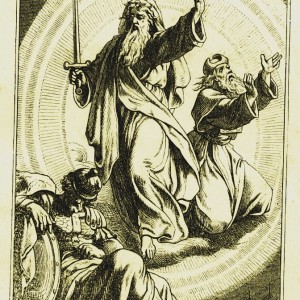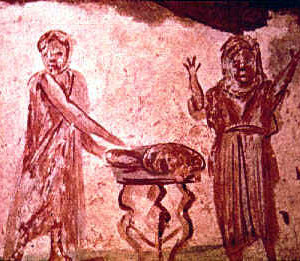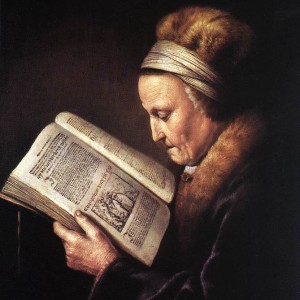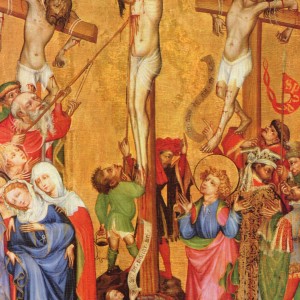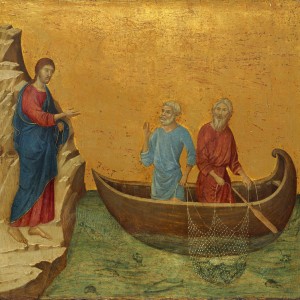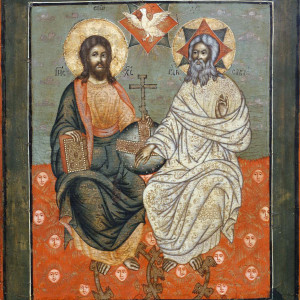An LDS couple I’m friends with asked me recently about the so-called Gospel of Philip, and specifically, about its claim that Jesus was married to Mary Magdalene. Let’s address the reliability of the “Gospel of Philip” first, and then the broader question: how do we know that Jesus wasn’t married? The So-Called Gospel of Philip… Continue reading How Do We Know Jesus Wasn’t Married?
Tag: Bible
The Deuterocanon and the Communion of Saints
If Catholics are right about the Books that make up the Bible, then we’re also right about the Communion of Saints. In fact, if the Second Book of Maccabees is true (whether or not the Book is inspired Scripture), then the Catholic doctrines on the Communion of the Saints are true, as well. How can… Continue reading The Deuterocanon and the Communion of Saints
Do Scripture and the Church Fathers Depict the Eucharist as a Sacrifice?
A Protestant reader wrote to me, asking how we Catholics could rectify the Sacrifice of the Mass with Hebrews 10:8-14, which describes Christ’s Sacrifice on Calvary as once-for-all: When he said above, “Thou hast neither desired nor taken pleasure in sacrifices and offerings and burnt offerings and sin offerings” (these are offered according to the law), then he… Continue reading Do Scripture and the Church Fathers Depict the Eucharist as a Sacrifice?
Five Ways to Defend the Faith Against Unexpected Attacks
There are times where we seek out opportunities to evangelize for the faith, but sometimes, the opportunity comes to us. When this happens, it’s not always pleasant. A couple months ago, for example, I was on a flight next to a guy who spent nearly the entire time telling me how rotten the Catholic Church… Continue reading Five Ways to Defend the Faith Against Unexpected Attacks
Defending the Deuterocanon, Book by Book (Part II)
On Tuesday, we explored why we Catholics have Tobit, Judith, Wisdom, and a longer version of Esther in our Bibles. Today, we’ll discuss why we have the other Deuterocanonical books: Sirach, Baruch, 1st and 2nd Maccabees, and the longer version of Daniel. V. Sirach (Ecclesiasticus) The Book was Probably Referenced by Jesus Christ: Sirach 27:6… Continue reading Defending the Deuterocanon, Book by Book (Part II)
Defending the Deuterocanon, Book by Book (Part I)
Much has been said, here and elsewhere, on why Catholics have 73 Books in our Bibles, instead of the mere 66 that our Protestant brethren have, or why we have longer versions of Daniel and Esther than Protestants. The Books in question, the Deuterocanon, are often defended as a group, as I did against arguments… Continue reading Defending the Deuterocanon, Book by Book (Part I)
Adam and Eve, Jesus and Mary
Yesterday was the second of the three-part “Shameless Popery” live apologetics series. It was entitled “The Priesthood of Christ & Adam and Eve, Jesus and Mary.” The second of those two topics, on the parallels between Adam and Eve with Jesus and Mary, is something that’s been covered before on this blog, but I wanted… Continue reading Adam and Eve, Jesus and Mary
Pope Peter, Part VI: The Fisher Pope
As part of the live “Shameless Popery” apologetics talk, we presented six major arguments presenting the Biblical case for the papacy. Five of those points were adapted from the “Pope Peter” series I did a while back (parts I, II, III, IV, and V), but there was a sixth argument that I prepared especially for the… Continue reading Pope Peter, Part VI: The Fisher Pope
Did Augustine Deny that the Catholic Church Gave Us the Scriptures?
A Reformed blogger, TurretinFan, rejects the authority of the early Ecumenical Councils, and suggests that every dispute needs to be resolved through Scripture, which is allegedly independent of the Catholic Church, the property of all. He cites to this passage from St. Augustine for support, which he suggests shows that Augustine “sounded exactly like a Sola Scriptura… Continue reading Did Augustine Deny that the Catholic Church Gave Us the Scriptures?
How Should Catholics Understand Romans 9?
In the comments on Friday’s post, a Calvinist convert to Catholicism asked what to make of Romans 9:18-21, which sound like Paul’s saying that God made some people for Heaven, and some people for Hell: You will say to me then, “Why does he still find fault? For who can resist his will?” But who are… Continue reading How Should Catholics Understand Romans 9?

